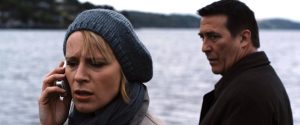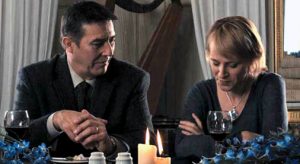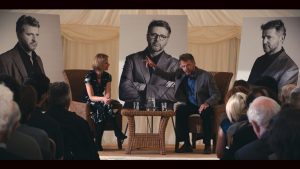“Then she knew. She knew that she was seeing a ghost, and she realized for perhaps the first time in her life, that she too would die. That her husband would die. And that her children would die. She knew in that moment, that she was looking at reality”
Is it a scarier prospect that ghosts are real, or just inventions of the mind? This is one of the fundamental questions wrestled with in the little watched Irish film “The Eclipse.” It is a film that focuses on loss, and how the people we love fill spaces in our world that don’t close easily when they’re gone. It is about holding onto whatever is left, even pain, in order to avoid forgetting, and how that can turn toxic and limiting. The film is a hybrid of a slow paced character study, relationship drama and horror. It borrows all sorts of tricks from the latter to ramp up tension and even provides a few jump scares and ghost sightings. Using voyeuristic camera angles, shots from inside darkened rooms and just behind railings or bushes, it gives the whole film a feeling of dread lurking just outside the frame. But this dread isn’t usually of the typical horror manner, it isn’t a chainsaw wielding maniac or vengeful spirit manifesting itself to expel intruders. The dread is of a more human kind. When someone loses a wife, a mother, a child or anyone really, what do they hold onto ultimately to keep their life from spinning out of control?
This movie came to mind as it related to Samhain even though it doesn’t take place during that time. It is more about the idea of Samhain, where the barrier between worlds, between the living and the dead, weakens and allows things to leak through. So many cultures celebrate this, this time or place where the worlds mingle and our laws of reality bend. That middle ground, where our dead loved ones walk among us, either through tricks of the mind or power of the spirit, fascinates me. The Eclipse has its own low key but unique exploration of this rich vein of narrative.
Early on we meet Michael Farr, played by Ciaran Hinds, who is a widower due to cancer and is raising two kids alone. He is a giant of a man, but one who has sunk so far into himself that while he fills space with his physical presence, his mourning reduces him in every other way. A man going through the motions of life, a thin veneer of living attempting to mask the deep lake of sorrow. In his early interactions in the film it is clear, so much of the world, especially his kids, can see right through that disguise. Michael begins seeing strange shapes, hearing noises and generally believing that he is witnessing ghosts of the dead (and nearly gone). And here the very small plot is set into motion. Michael drives folks around for a local literary convention, and one of them, Lena Morrell (Iben Hjejle) has written a book about ghosts and a small relationship starts to build. Complicating things are Lena’s previous lover, played in smarmy glory by Aidan Quinn, Michael’s kids who are acting out, and a father in law dealing with grief in his own bitter way.
This is not a loud movie, not a movie that shouts at you or demands your revulsion like many horror films. If you met this movie in a dark alley it would trudge by with its head down, avoiding eye contact and just making the hair on the back of your neck stand up as the melancholy heartbreak washes over you. It isn’t a machete to the collarbone, but instead a fine scalpel wielded just right to expose raw emotional nerves. As Michael has more and more incidents, and is plagued by ghoulish images of his father in law, he finds himself wishing for a different kind of haunting, longing in a way for visits from his dead wife. And here this central theme of loss and remembrance are most directly confronted. It might not even matter to him if the apparitions are real or imagined, he is willing to accept any form of appearance, just to push away his fear of forgetting. Grief can be a strange beast to wrestle with, throwing lives into suspension as the space occupied by the dead is frozen in remembrance and any attempt to move on feels like desecration. Michael is trapped in this cycle, still wearing his wedding ring, longing for the ghostly apparitions that haunt him to be his wife.
To me, this film was excellent, and well worth watching. It does however come with extremely heavy mental and emotional baggage, so view this as a trigger warning before watching. I lost my mother to cancer when I was close to the age of the boy in the film, and watched how that grief blanketed our family. I can look back today and see the fault lines in my own life radiating out from that moment, how it irreversibly shaped me, destroyed me and reformed me. In order to have anything in life we risk loss, and while this film shows characters plunged deep into that seemingly bottomless well of anguish, it also shows us the tiny rays of light that peak through, hinting at life still to be lived. It shows grief with quiet grace and understanding, and mostly avoids sickly sweet devices used by many films. At least I can say with confidence, it is a far better use of your time than watching The Twilight Saga: Eclipse, which came out soon after this and forever buried this little film in any google search.



